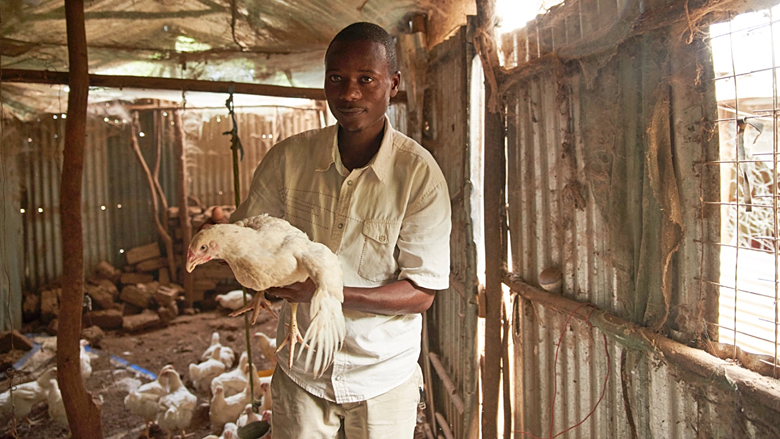The Global Refugee Crisis
It is this room for market growth, combined with the growing expenses of supporting huge refugee populations that create a scenario ripe for innovation and private sector involvement. Twenty-four people are displaced from their homes every minute, and worldwide, displacement has never been more common. One in every 113 people is a refugee, internally displaced person, or an individual seeking asylum.
Eighty-five percent of refugees live in developing countries, often in poor areas which are already struggling to provide the services that local communities need. The influx of large numbers of refugees adds pressure. It’s no surprise that settlements like Kakuma lack services in areas of banking and telecommunications.
Room for Investment
Could increasing private sector investments in refugee camps, such as Kakuma, be a viable business opportunity? World Bank Group research suggests yes. Kakuma offers significant potential for the private sector to invest, to the benefit of both refugees and their host communities. Specifically, the report identifies opportunities within the camp for at least two major supermarkets, banks, microfinance institutions, telecommunications companies, small and medium enterprises selling food and everyday items. The success and longevity of the thousands of informal businesses within Kakuma camp and the surrounding area supports this finding. Despite the challenging living situation in Kakuma, the demand of its residents for everyday goods and services is significant.
“Before fleeing their home countries many forcefully displaced persons were trained professionals, business people, owned homes, and supported families,” says Raouf Mazou of UNHCR. “Although their circumstances change when living in a refugee camp, they still desire a dignified life. Supporting investments in sustainable businesses can not only reduce dependency on aid, but also help residents of a refugee camp start to regain a sense of normalcy.”
Traditionally, the private sector has been somewhat wary of investing in locations serving as hosts to refugees. Employing workers can be complicated due to low levels of education or legal and regulatory limitations that make it difficult for refugees to gain authorization to work. The remoteness of many refugee camps makes them potentially difficult and expensive places to do business. Poor infrastructure, restrictive regulations, and complex political economies also prove to be legitimate challenges.
But despite these obstacles, the research in Kakuma suggests that refugee camps actually create more “boom” than “gloom” for their host countries, and are worth investing in. In Kakuma camp, The World Bank Group found that the presence of the refugee camp has increased the host region’s economic output by 3.4% and local employment by 2.9%. Most surprisingly, the presence of the camp is highly correlated with greater physical health for members of the host community.
With a pronounced demand for goods and services in and around the camp and the positive benefit refugees can have on their host country, the time seems right for businesses and social enterprises to get more involved in Kakuma camp and other areas hosting refugees. With some humanitarian agencies reducing overall levels of support and shifting from in-kind donations to cash transfers, the market opportunity is only going to get bigger.
Many companies are either already seizing on the opportunities or are well-positioned to do so. For instance, Equity Bank, the largest commercial bank in Africa, has developed financial services that both refugees and members of the host community can use, including bank accounts and access to credit. The business model in Kakuma has thus far been profitable, and it is looking to expand its activities. Sanivation, a Kenyan social enterprise established in 2011, is piloting a project in Kakuma for in-home toilets that convert waste into fuel. The company addresses two of the most pronounced needs in the camp – sanitation and cooking fuel – and as a result faces an opportunity to expand. M-Kopa and D.light are solar energy companies that specialize in providing electricity to low-income customers in remote areas off the grid.
Maximizing Finance for Development
The evolving refugee crisis calls for innovative approaches. The joint World Bank – IFC – UNHCR - work on Kakuma sheds light on the opportunities in this substantial, but mostly untapped market. “The opportunities are there. but the market is new and risky,” says Michel Botzung, IFC’s Manager for Fragile & Conflict Situations in Africa. “So assessing the market potential and identifying areas where development institutions can help reduce apparent risks, are important.”
The World Bank Group and the United Nations are teaming up with the Africa Enterprise Challenge Fund to facilitate further private sector investment in Kakuma and other refugee areas. Together the three institutions are launching a business challenge in November 2018 to attract more private businesses to the area. The competition will be open to Kenyan companies and social entrepreneurs, as well as refugee and host-community entrepreneurs. Winners will receive grants, financing, and coaching.
The business challenge builds on the World Bank’s support to the Government of Kenya in the form of a $100 million credit and a $3 million grant. The Development Response to Displacement Impacts Project in Kenya, approved in April 2017, seeks to improve access to basic social services, expand economic opportunities, and enhance environmental management in Kakuma and the surrounding area.
According to Apurva Sanghi, the synergy of these initiatives is one way the World Bank Group, partnering with others, can maximize finance for development. “We know that the people of Kakuma Camp and Turkana County have the ingenuity, motivation, and determination to build livelihoods for themselves. By combining public and private sector resources, we can further support an inclusive social and economic infrastructure around these communities, while neutralizing some of the risk and encouraging even more investment.”

